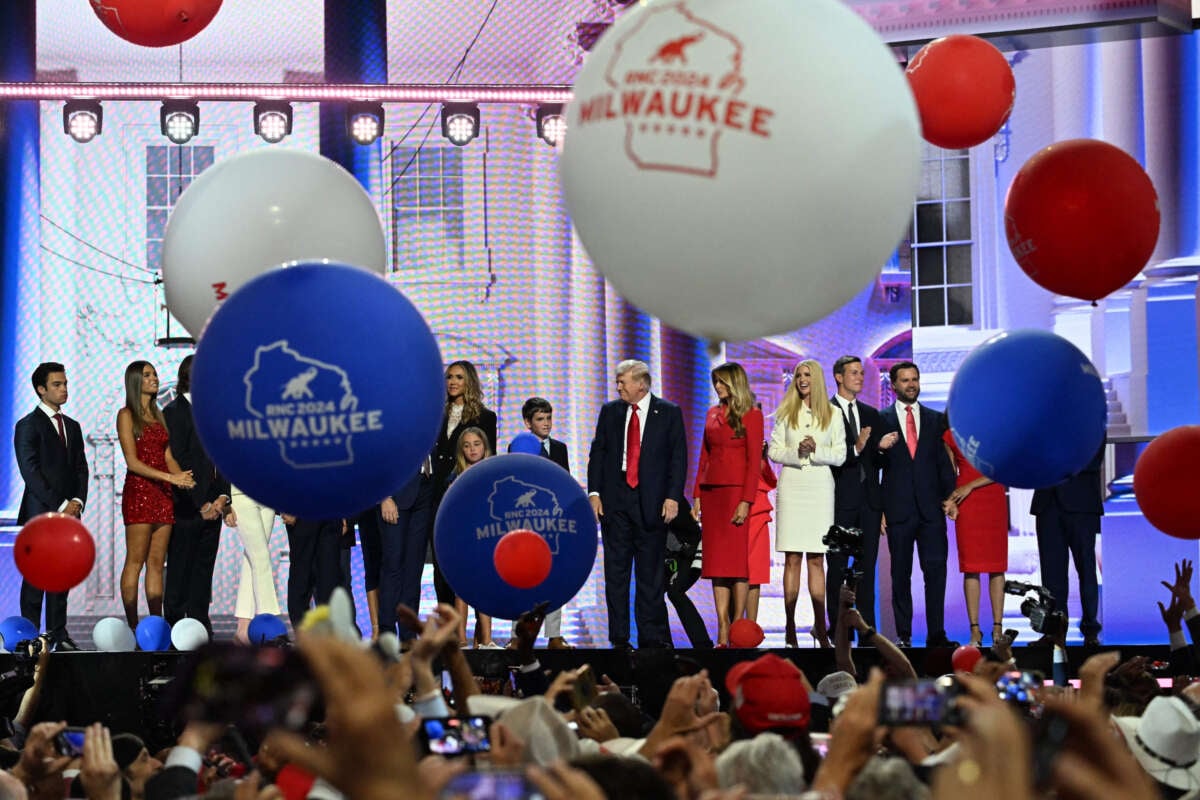As the 2024 Republican National Convention wraps up, Americans are anxious to know where the presidential candidates stand following the week of GOP campaigning in Milwaukee, Wisconsin.
It’s unclear as of yet whether voters’ preferences have shifted, as polling hasn’t been published in the day since former President Donald Trump accepted his party’s nomination. But the events of the past week do suggest that the convention will have little impact in the long run for Trump and Republicans.
Delegates and attendees were decidedly optimistic about Trump, according to observations from Truthout reporters who were present at the convention. That enthusiasm was also evident in nightly broadcasts of the convention, with attendees regularly breaking out into chants of support for speakers.
But the attitude of the Republican Party doesn’t necessarily reflect the attitudes of voters overall. Indeed, the image that Republicans presented to the American public in Milwaukee was far from the full picture, and voters may be turned off as the more extremist elements of the GOP’s agenda come under increasing scrutiny.
J.D. Vance, for example, the Ohio Republican senator who Trump selected to be his vice presidential running-mate, strategically downplayed many of his stances during his speech to delegates on Wednesday. Missing from his “everyman” presentation littered with populist sentiments was the fact that much of his success is due to financiers like tech billionaire Peter Thiel. Also left out of Vance’s speech were his draconian views on abortion, including his past calls for a federal ban on the procedure with no exceptions for rape or incest.
Polling currently suggests that most Americans don’t have a strong opinion on Vance, who wasn’t a national figure prior to being named the vice presidential candidate. As his views come to the forefront in the coming weeks (particularly his opposition to abortion rights), voters may be less likely to support the GOP ticket, as polling has repeatedly shown that a majority of Americans oppose a total abortion ban.
Who will ultimately be nominated as the Democratic candidate will also affect how the GOP fares in the 2024 election. It’s beginning to look like President Joe Biden may drop out of the race, making way for a different Democrat (likely Vice President Kamala Harris) to run instead. If that happens, the weeklong attacks against Biden by Republican speakers may have been for naught.
Biden is a deeply unpopular president, and polling has found that most Democratic voters want him to withdraw from the presidential race. If Biden drops out, undecided voters may give the Democratic ticket another examination. The party could also see a boost from Democratic-leaning voters who have been disgusted by Biden’s role in Israel’s genocide of Palestinians in Gaza.
Truthout reporting on a massive protest during the Republican National Convention suggests that the U.S.’s complicity in Israel’s genocide remains a critical issue to voters. More than 100 organizations and thousands of individuals from around the country demonstrated within the “soft” zone of the convention, voicing their anger at both parties for continuing to fund the genocide, as well as their opposition to Trump’s stances on reproductive rights, workers’ rights, and more.
Meanwhile, Trump’s speech on the final night of the convention may not increase his appeal to undecided voters, as he meandered from topic to topic and peddled anti-immigrant lies throughout his remarks. While Trump claimed to be for unity, he also attacked Democrats, including Biden and former Speaker of the House Nancy Pelosi. And he used the attempt on his life this past weekend to demand that criminal charges against him be dropped — a move that a majority of voters are opposed to.
Trump’s supposed call for unity was also largely disregarded by speakers before him, many of whom used the platform to spew vitriol toward Democrats, progressive ideas, and marginalized groups like immigrants and transgender children, according to analyses throughout the week.
Although not indicative of how every undecided voter felt about Trump’s speech, many of the undecided voters who spoke to reporters after his comments said they were underwhelmed.
Rick Gagliano, an undecided voter from Wisconsin who appeared on Fox News’s “Fox & Friends” program Friday morning, said he got “bored” during Trump’s speech and that he wasn’t pushed “any closer to him” by what he heard — but added that he would still probably vote for Trump.
Undecided voters who spoke with The New York Times had a similar response to Trump’s speech.
“I still don’t know what I’m going to do. [Trump] tried, I think, to be much more unifying at the beginning. But then he got on his high horse there at the end,” said Sharon Reed, a retired teacher from Pennsylvania who has voted for Trump in the past.
Arnel Ramos, a food service worker in Milwaukee, said she was unsettled by Trump’s speech, particularly Trump’s anti-immigrant rhetoric and his aggressive tone on foreign policy.
“You read a lot of stuff about what this guy says, but to actually sit down and hear it and sit through it, it was just insane to me,” Ramos told the Times. “That’s the only way I can describe this whole ordeal.”
Although Republicans appear to be exiting Wisconsin confident that their candidate will win, it’s unlikely the convention will move the needle for U.S. voters. A bump in the polls is expected, of course, as is typical for both parties after their conventions, but whether the GOP will see a major improvement or merely a small uptick remains to be seen.
Media that fights fascism
Truthout is funded almost entirely by readers — that’s why we can speak truth to power and cut against the mainstream narrative. But independent journalists at Truthout face mounting political repression under Trump.
We rely on your support to survive McCarthyist censorship. Please make a tax-deductible one-time or monthly donation.
